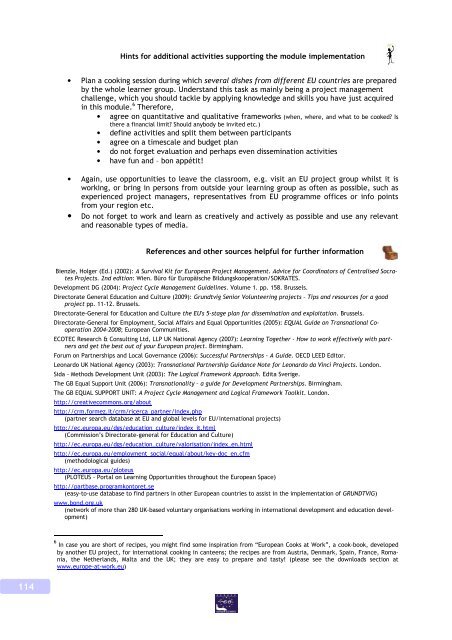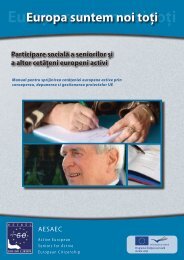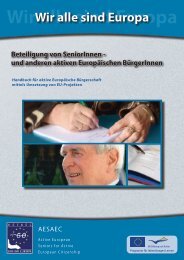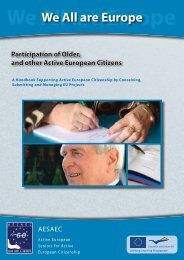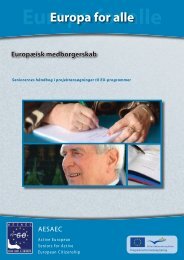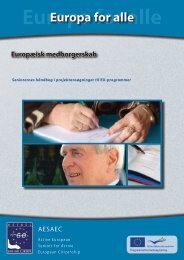We All are Europe - AESAEC
We All are Europe - AESAEC
We All are Europe - AESAEC
Create successful ePaper yourself
Turn your PDF publications into a flip-book with our unique Google optimized e-Paper software.
Hints for additional activities supporting the module implementation<br />
• Plan a cooking session during which several dishes from different EU countries <strong>are</strong> prep<strong>are</strong>d<br />
by the whole learner group. Understand this task as mainly being a project management<br />
challenge, which you should tackle by applying knowledge and skills you have just acquired<br />
in this module. 6 Therefore,<br />
• agree on quantitative and qualitative frameworks (when, where, and what to be cooked Is<br />
there a financial limit Should anybody be invited etc.)<br />
• define activities and split them between participants<br />
• agree on a timescale and budget plan<br />
• do not forget evaluation and perhaps even dissemination activities<br />
• have fun and – bon appétit!<br />
• Again, use opportunities to leave the classroom, e.g. visit an EU project group whilst it is<br />
working, or bring in persons from outside your learning group as often as possible, such as<br />
experienced project managers, representatives from EU programme offices or info points<br />
from your region etc.<br />
• Do not forget to work and learn as creatively and actively as possible and use any relevant<br />
and reasonable types of media.<br />
References and other sources helpful for further information<br />
Bienzle, Holger (Ed.) (2002): A Survival Kit for <strong>Europe</strong>an Project Management. Advice for Coordinators of Centralised Socrates<br />
Projects. 2nd edition: Wien. Büro für Europäische Bildungskooperation/SOKRATES.<br />
Development DG (2004): Project Cycle Management Guidelines. Volume 1. pp. 158. Brussels.<br />
Directorate General Education and Culture (2009): Grundtvig Senior Volunteering projects – Tips and resources for a good<br />
project pp. 11-12. Brussels.<br />
Directorate-General for Education and Culture the EU's 5-stage plan for dissemination and exploitation. Brussels.<br />
Directorate-General for Employment, Social Affairs and Equal Opportunities (2005): EQUAL Guide on Transnational Cooperation<br />
2004-2008; <strong>Europe</strong>an Communities.<br />
ECOTEC Research & Consulting Ltd, LLP UK National Agency (2007): Learning Together - How to work effectively with partners<br />
and get the best out of your <strong>Europe</strong>an project. Birmingham.<br />
Forum on Partnerships and Local Governance (2006): Successful Partnerships - A Guide. OECD LEED Editor.<br />
Leonardo UK National Agency (2003): Transnational Partnership Guidance Note for Leonardo da Vinci Projects. London.<br />
Sida - Methods Development Unit (2003): The Logical Framework Approach. Edita Sverige.<br />
The GB Equal Support Unit (2006): Transnationality – a guide for Development Partnerships. Birmingham.<br />
The GB EQUAL SUPPORT UNIT: A Project Cycle Management and Logical Framework Toolkit. London.<br />
http://creativecommons.org/about<br />
http://crm.formez.it/crm/ricerca_partner/index.php<br />
(partner search database at EU and global levels for EU/international projects)<br />
http://ec.europa.eu/dgs/education_culture/index_it.html<br />
(Commission’s Directorate-general for Education and Culture)<br />
http://ec.europa.eu/dgs/education_culture/valorisation/index_en.html<br />
http://ec.europa.eu/employment_social/equal/about/key-doc_en.cfm<br />
(methodological guides)<br />
http://ec.europa.eu/ploteus<br />
(PLOTEUS - Portal on Learning Opportunities throughout the <strong>Europe</strong>an Space)<br />
http://partbase.programkontoret.se<br />
(easy-to-use database to find partners in other <strong>Europe</strong>an countries to assist in the implementation of GRUNDTVIG)<br />
www.bond.org.uk<br />
(network of more than 280 UK-based voluntary organisations working in international development and education development)<br />
6 In case you <strong>are</strong> short of recipes, you might find some inspiration from “<strong>Europe</strong>an Cooks at Work”, a cook-book, developed<br />
by another EU project, for international cooking in canteens; the recipes <strong>are</strong> from Austria, Denmark, Spain, France, Romania,<br />
the Netherlands, Malta and the UK; they <strong>are</strong> easy to prep<strong>are</strong> and tasty! (please see the downloads section at<br />
www.europe-at-work.eu)<br />
114


